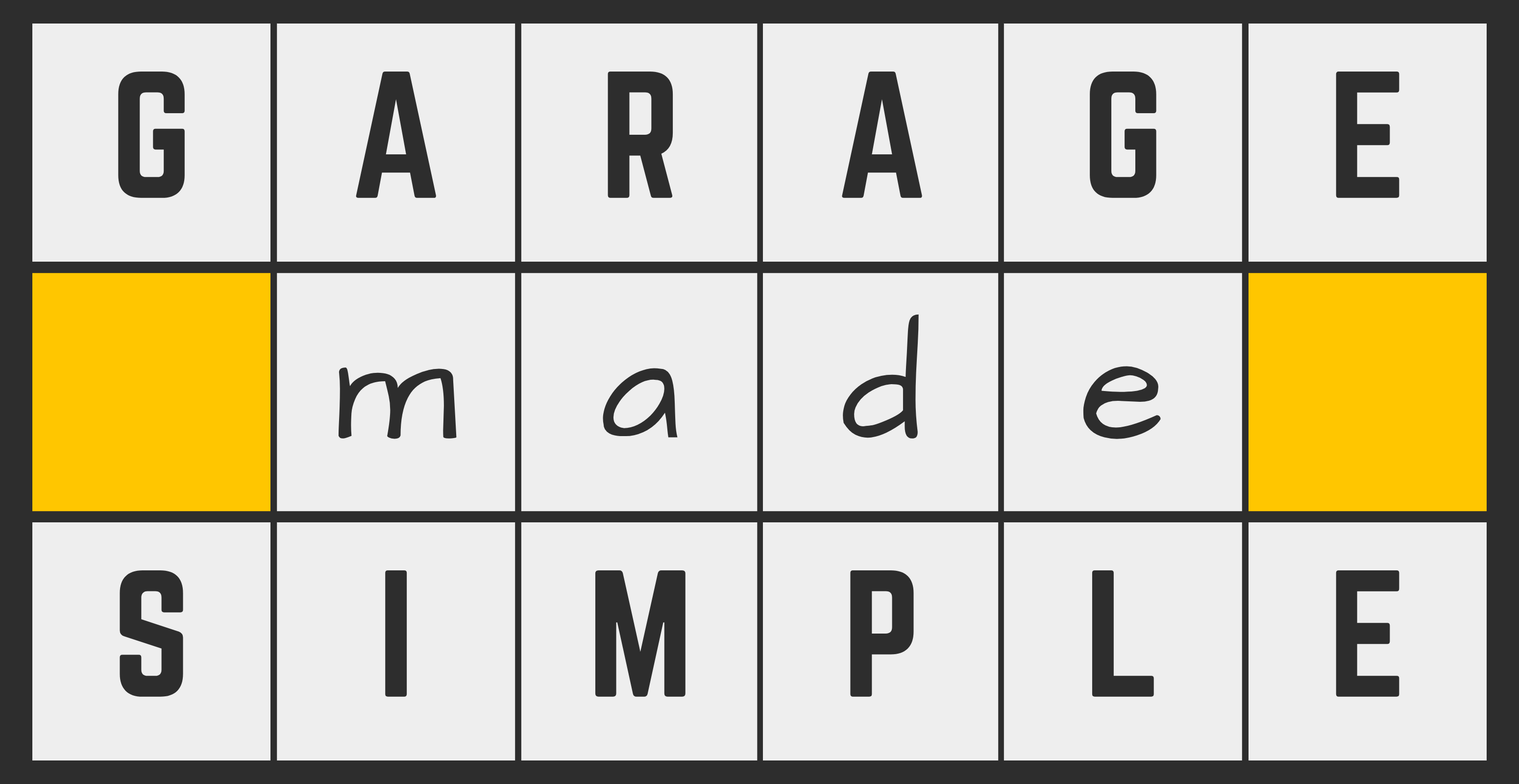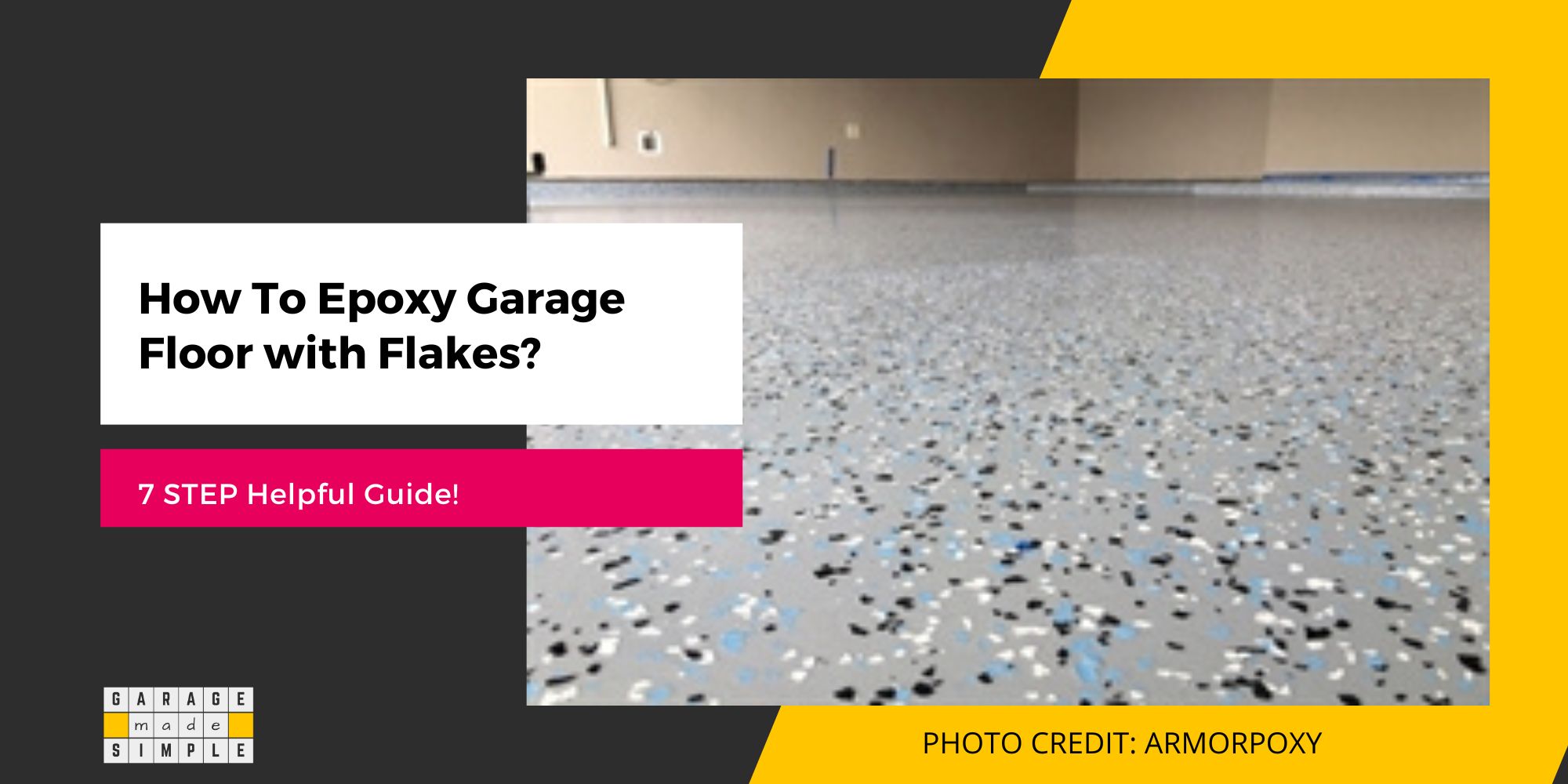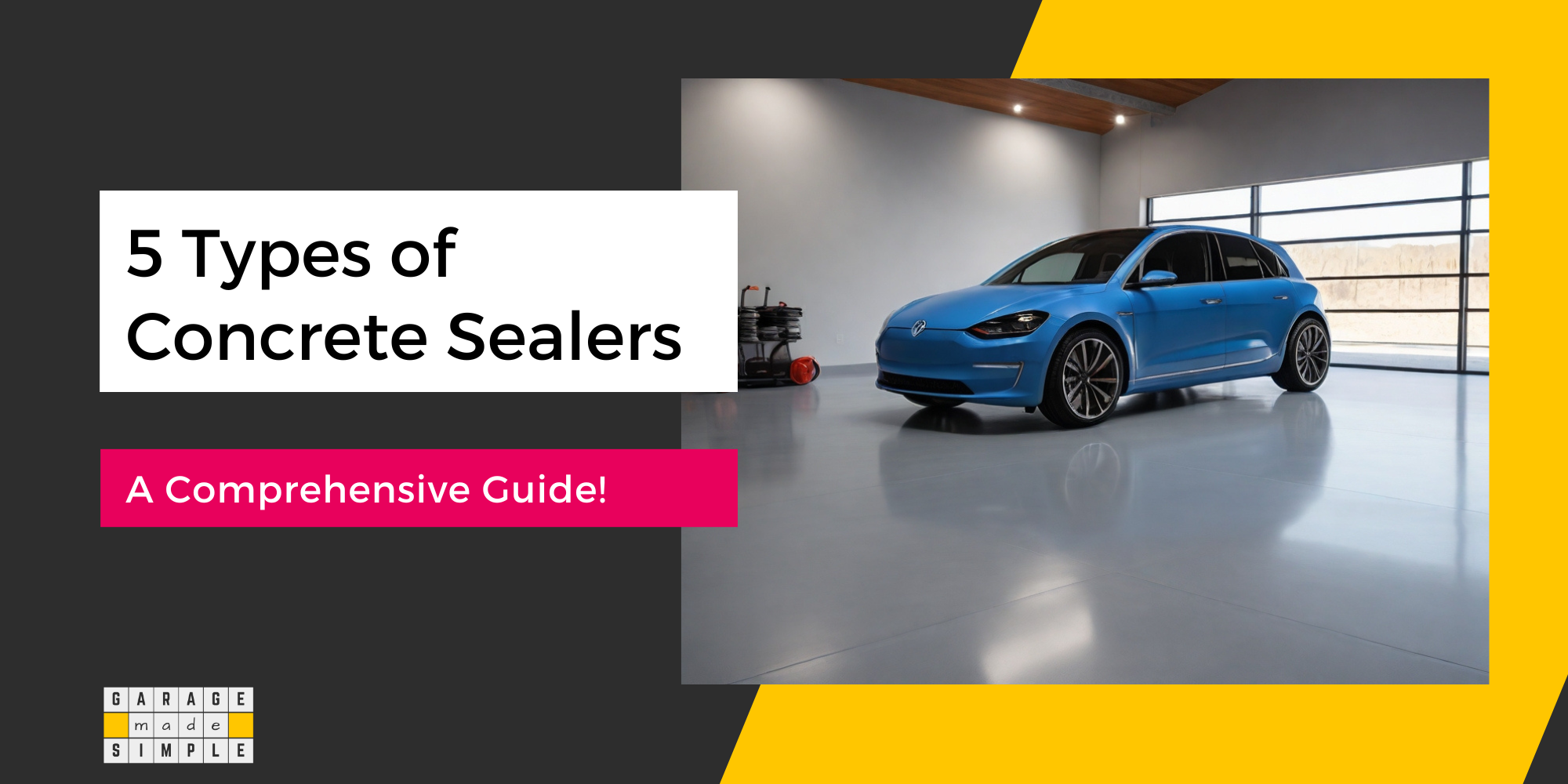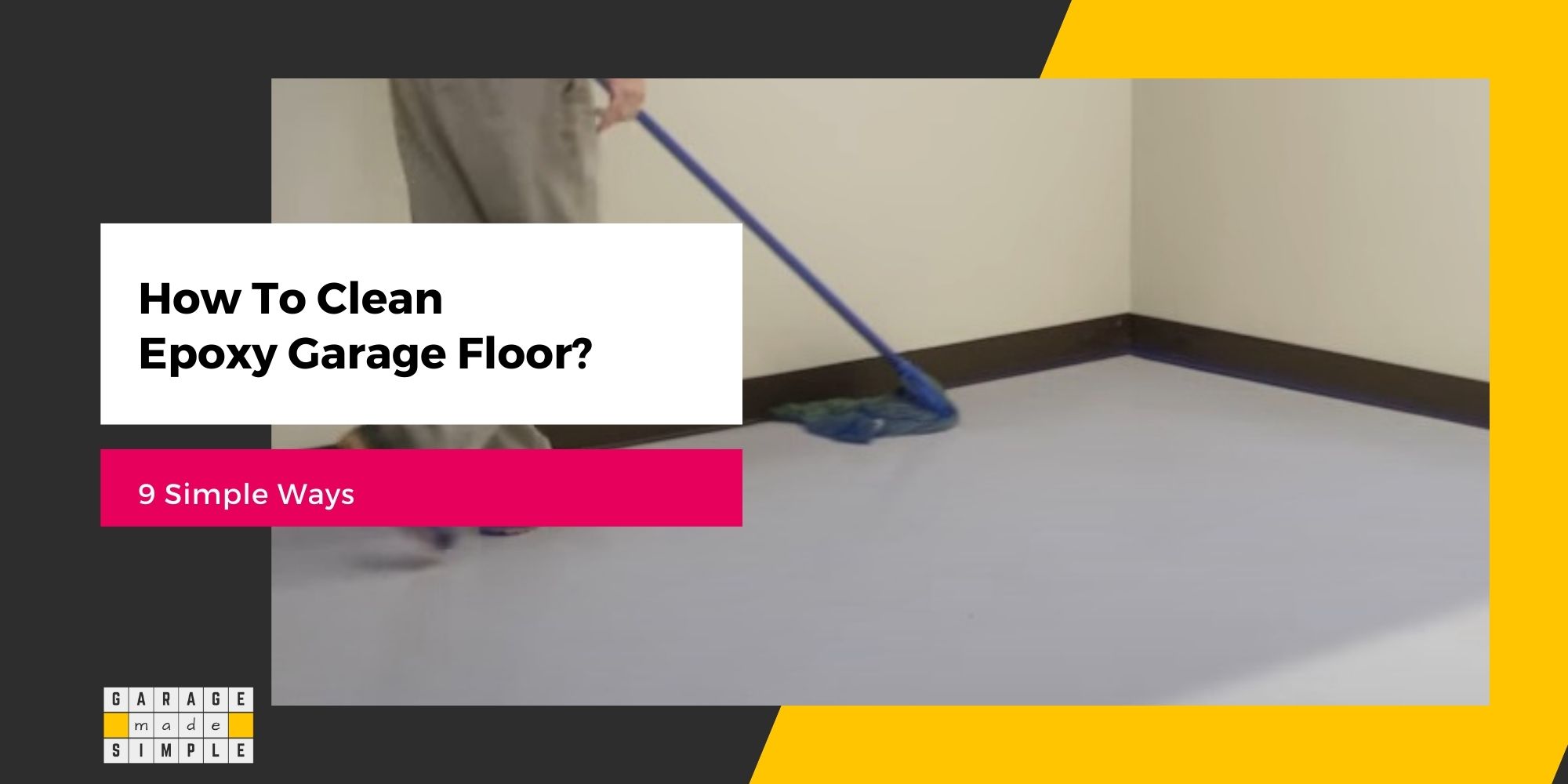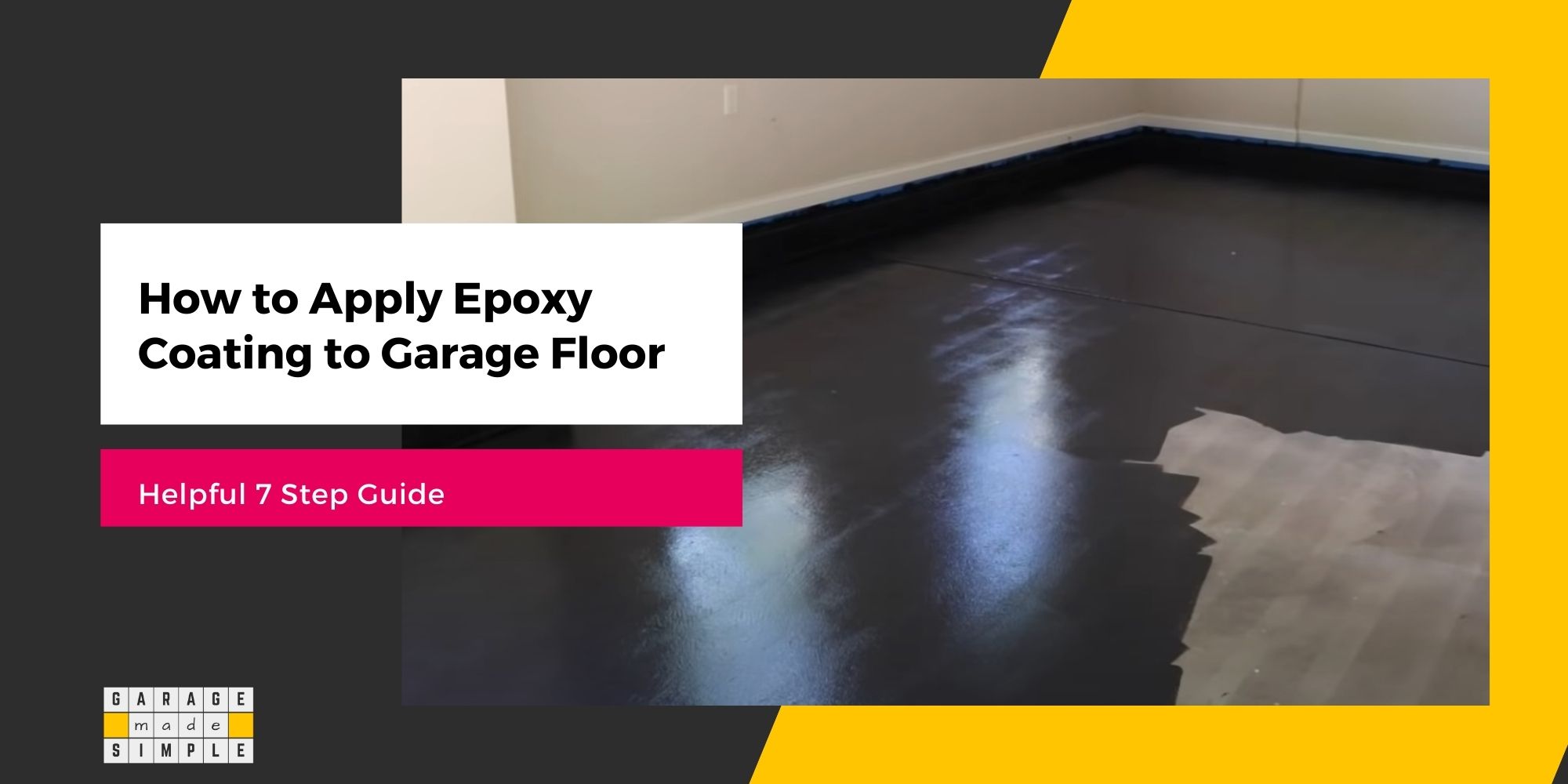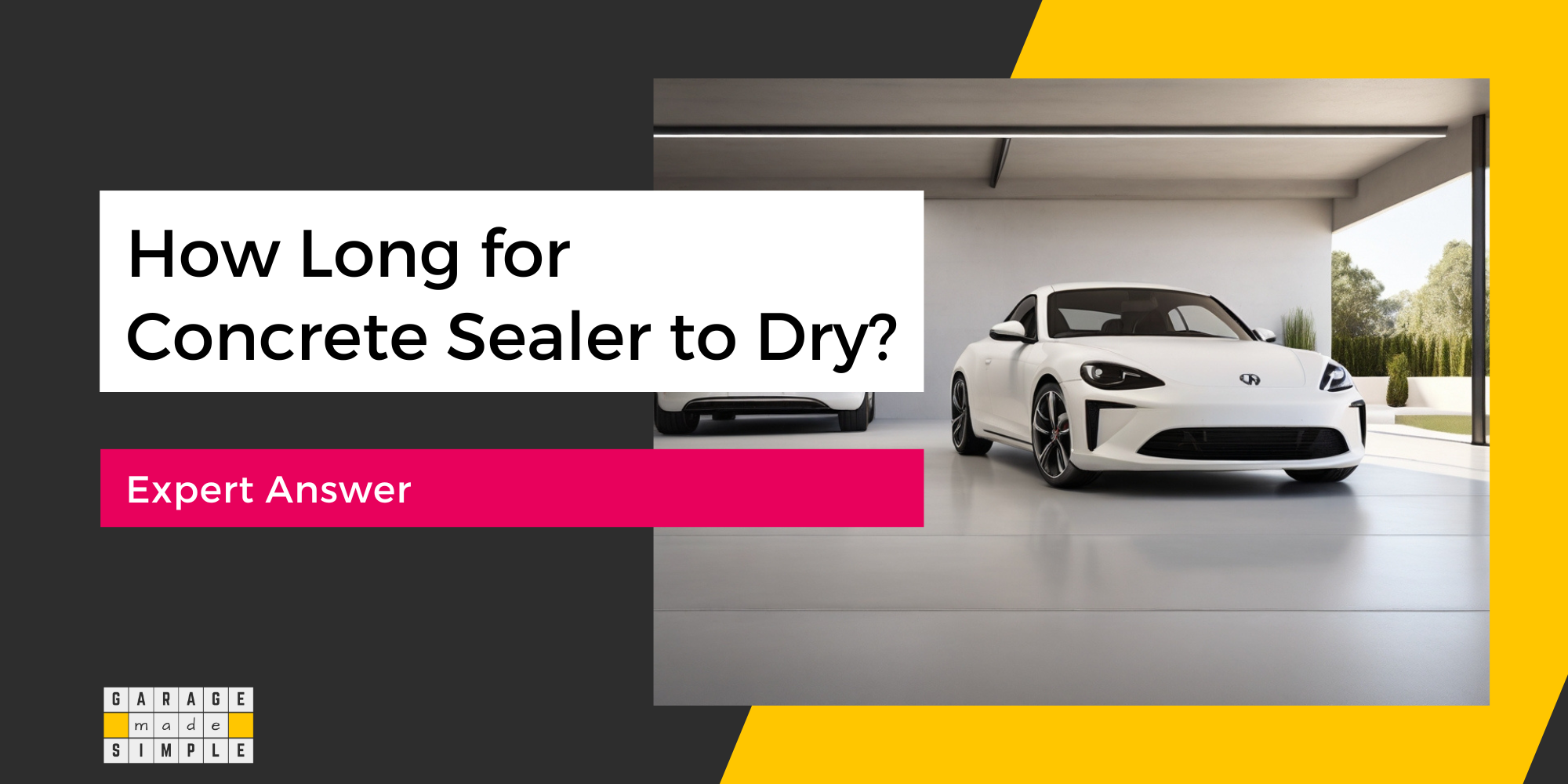Polyurea vs Epoxy Garage Floor: Which is Best Value in 2024!
garagemadesimple.com is a participant in the Amazon Services LLC Associates Program, an affiliate advertising program designed to provide a means for sites to earn advertising fees by advertising and linking to Amazon.com . The website is also an affiliate of a few other brands.
Polyurea vs Epoxy Garage Floor
Epoxy garage floors have been around for a while. Polyurea coating for a garage floor is a recent development. So, when it comes to a polyurea vs epoxy garage floor, which will give you the best value for money?
When it comes to a polyurea vs epoxy garage floor, polyurea is the best value for money. A polyurea garage floor will cost $21.33 per year of useful life for every 100 square feet, whereas, a 100% solids epoxy garage floor will cost $27.87 per year of useful life for every 100 square feet.
Of course, you must consider other parameters too, when evaluating a polyurea vs epoxy garage floor.
In the next section I do exactly that. I evaluate a polyurea vs epoxy garage floor on a range of parameters. So read on.
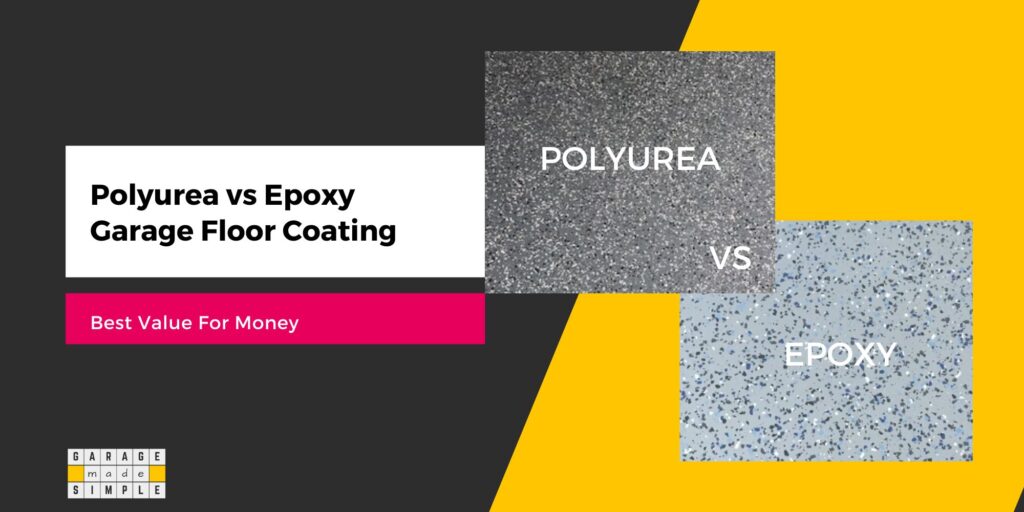
The main difference between polyurea and epoxy floor coatings is in the chemistry of the resin used as the binder in the formulation. Polyurea resin is in fact a subset of polyurethane resin. Polyaspartic, another type of garage floor coating, uses a specific type of polyurea resin. In that sense, Polyaspartic is just a type of polyurea.
Polyurea vs Epoxy Garage Floor: Performance Comparison
When comparing a polyurea vs epoxy garage floor you must give maximum importance to the performance characteristics of each coating. Some of the important parameters of performance worth evaluating are:
Bonding Strength with Concrete
The bonding strength with concrete is a measure of the degree of adhesion of the coating to the concrete floor. In case the bonding strength is weak then the coating is likely to peel within a short time.
One part polyurea garage floor coating penetrates and bonds with the concrete floor better than two-part epoxy coating. This means that polyurea garage floors are less likely to have a problem of peeling as compared to epoxy garage floors.
Flexibility & Hardness
The flexibility of a material is its ability to deform under stress but retain its original shape once the stress is removed. Polyurea is more flexible than epoxy. However, polyurea is not as hard as an epoxy coating.
Polyurea has a lower scratch resistance but higher impact resistance, when compared to epoxy coatings.
An example that will make this concept more clear is to think of polyurea as a rubber mat and epoxy as a glass sheet on a workbench.
You can drop a hammer on the rubber pad without causing any damage. Drop the same hammer on the glass sheet and it will shatter. On the other hand, you can scratch the rubber mat with a screwdriver but you cannot do that to the glass sheet.
I think you get the idea!
Dry Film Thickness (DFT)
Dry Film Thickness (DFT) is measured once the coating has fully cured. Dry Film Thickness (DFT) can be calculated by multiplying volume solids by Wet Film Thickness (WFT).
For example:
Armorclad, a 3-layer epoxy system, with primer + 100% solids epoxy + 2-part Topcoat has an approximate total DFT of 20 mils.
SPGX. a 1-part Polyurea, applies at approximately 4 mils/coat. So, even a 2-layer system will add up to a DFT of just 8 mils.
(A mil is 1/1000 of an inch while a micron is 1/1000 of a millimeter)
For the same coating type, a higher dry film thickness (DFT) will result in higher strength and longer life against abrasion. The DFT comparison is meaningful within the same coating type. A comparison based on DFT, across different types of coatings is quite meaningless.
Durability
The durability of a garage floor coating depends on the type of stresses that the garage floor is exposed to, as well as the environmental conditions.
The garage floor is subjected to abrasive stress, all the time, from vehicular & foot traffic. Abrasion is an important reason for epoxy garage floors being dusty. It can also experience some stress due to impacts from dropping of heavy objects, such as hammers or power tools.
Polyurea performs better against impacts as compared to epoxy. Epoxy on the other hand is very hard wearing and canl handle abrasion better than polyurea.
In case your garage gets a significant amount of sunlight from open garage doors or windows, then polyurea will perform better than epoxy. Polyurea has high UV resistance whereas the UV resistance of epoxy is quite low.
Both polyurea and epoxy are fairly chemical resistant and impervious to oil spills & grease stains.
Overall, when it comes to a polyurea vs epoxy garage floor, polyurea is more durable than epoxy.
Longevity
In standard conditions an epoxy garage floor will last 3 to 5 years. After this you will have to consider recoating the epoxy floor. The cracks, discoloration and delamination of the epoxy coating will not be acceptable to you anymore. Of course, epoxy coatings are better than epoxy paint when it comes to durability.
On the other hand, polyurea garage floors are known to last for 10 to 15 years. The long life is one of the major advantages of polyurea coating, when it comes to a polyurea vs epoxy garage floor.
Abrasion Resistance
When it comes to polyurea vs epoxy garage floor coatings, both can handle micro scratches, such as those from sand on tires or footwear, equally well. Epoxy, however, will handle deeper abrasive scratches, such as those from furniture or ladders, better than polyurea.
Chemical Resistance
Both polyurea and epoxy have a high degree of resistance to household cleaning chemicals and the usual food & beverages. Both resist the absorption of oil spills & grease stains equally well. Both types of coatings are therefore easy to clean and maintain.
UV Resistance
Polyurea, being from the polyurethane family, has a high UV resistance. On the other hand, epoxy has quite poor UV resistance. Under strong sunlight, epoxy can yellow and the film can lose its gloss.
It is therefore not unusual to use a polyurethane (PU) clear topcoat over an epoxy garage floor coating.
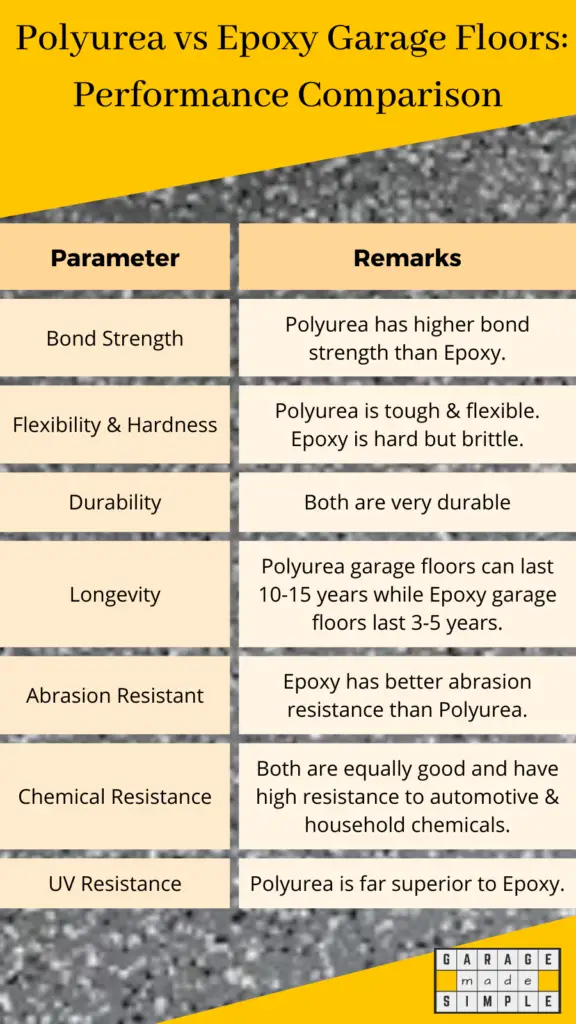
Polyurea vs Epoxy Garage Floor: Ease of Application
The application procedure for both Polyurea and Epoxy coatings is broadly similar. But there are some differences between the two when it comes to the details.
The ease of application, or lack thereof, depends on following factors:
Surface Preparation
For any paint application and certainly for a high-performance floor coating application, surface preparation is extremely crucial. In general the surface preparation for a Polyurea vs Epoxy garage floor is the same.
After the required surface preparation, I recommend using a suitable primer. Though the primer adds to the initial cost, it results in a better, thicker and more uniform finish coat.
Should you choose not to apply the primer coat, Polyurea will adhere more strongly to the bare concrete surface than an Epoxy coating.
Mixing and Pot Life
Polyurea coating is a 1-part product and mixing between a base & a hardener is not a requirement.
100% solids Epoxy coating is a 2-part product. Part A (base) needs to be mixed with part B (hardener) in the ratio prescribed by the manufacturer.
Once mixed, the curing process starts. The mixture has a pot life, usually between 30-50 minutes. You must complete the application in this timeframe else the liquid coating will solidify in the can itself.
You will also run into a problem if the ratios are not correct. In case you add a lower quantity than prescribed, of part B (hardener), then the curing will be incomplete. The garage floor will remain tacky and will never become hard, as required.
1-part Polyurea coating is a lot easier to apply than 2-part Epoxy coating.
Curing Time
Curing time is the time taken for the coating to become completely hard after application.
Most Polyurea coatings cure fast. SPGX from Armorpoxy is good to walk on in 3-4 hours. You can park your cars after 24 hours of application.
Epoxy coatings take much longer to cure. ArmorClad 100% 2-part Epoxy is ready for foot traffic in 12-14 hours. You can start moving your car and other belongings in the garage only 5-7 days after application.
Using Polyurea garage floor coating can save you a lot of time. This is particularly useful if you do not have temporary storage space for the stuff in your garage.
Curing Temperatures
Epoxy coatings should be applied only when the ambient temperature is above 55° F. However a Polyurea coating can be applied at temperatures as low as 45° F.
This is great news for locations with colder temperatures. You do not need to wait for midsummer to renew your garage floor.
Volatile Organic Compounds (VOC)
Both 1-part Polyurea and 2-part Epoxy used for coating garage floors are 100% solids. This means that the volatile organic compound (VOC) component in the formulation is practically zero.
So both 100% Polyurea and 100% Epoxy are eco-friendly.
Polyurea vs Epoxy Garage Floor: Cost Comparison
Armorpoxy is a leading manufacturer of a large range of floor coatings. I will use their products as a reference to compare costs.
The price of Armorpoxy Flake Polyaspartic Flooring Kit (1 Car Garage Kit) which covers 300 sq ft can be checked by clicking the link below:
The price of Polyurea garage kit is $639.99 for the kit or $213.33 per 100 sq ft for gray color. Assuming the Polyurea garage floor lasts for 10 years, the cost per year for 100 sq ft works out to $21.33.
The price of a Armorclad Epoxy Kit w/ Topcoat (1 Car Garage Kit) which covers 300 sq ft can be checked by clicking the link below:
The price of 100% solids Epoxy garage kit is $417.99 for the kit or $139.33 per 100 sq ft for gray color. Assuming an Epoxy garage floor lasts for 5 years, the cost per year for 100 sq ft works out to $27.87.
Conclusion
Polyurea garage floor coatings are the best value for money when compared with Epoxy garage floor coatings as seen from the table below:
| Coating Type | 1 Car Kit Cost(covers 300 sq ft) | Cost per 100 sq ft | Cost per year per 100 sq ft |
| Polyurea Armorpoxy Flake Polyaspartic Flooring Kit (Service Life assumed at 10 years) | $639.99 | $213.33 | $21.33 |
| Epoxy Armorclad Epoxy Flooring Kit with Topcoat (Service Life assumed at 5 years) | $417.99 | $139.33 | $27.87 |
Thank you very much for reading the post. I do hope you found it informative and useful.
